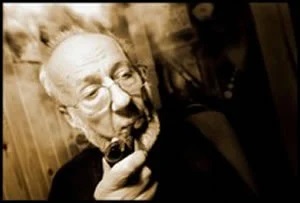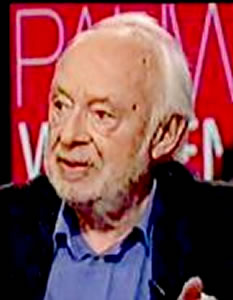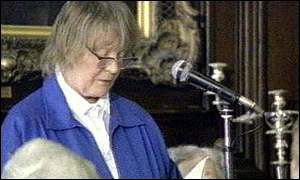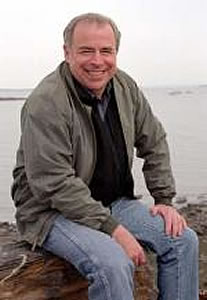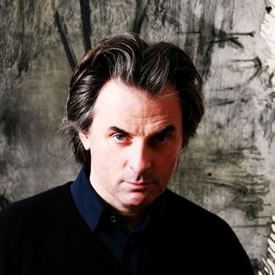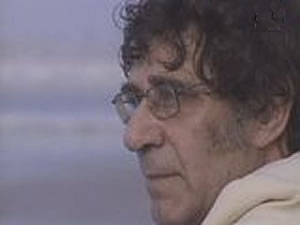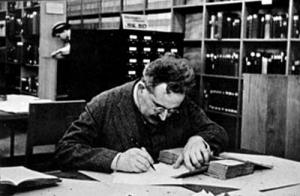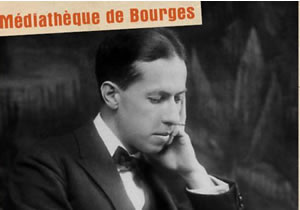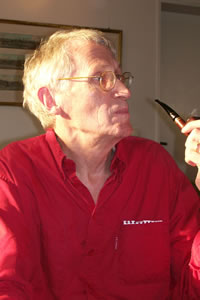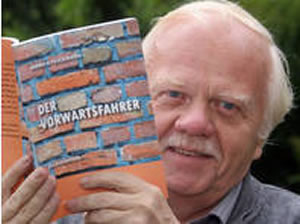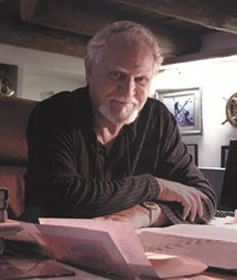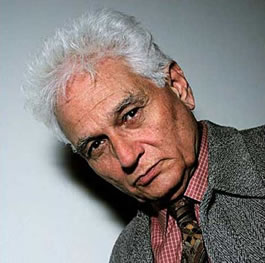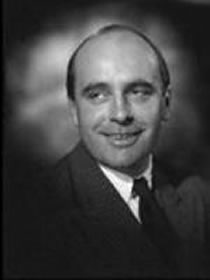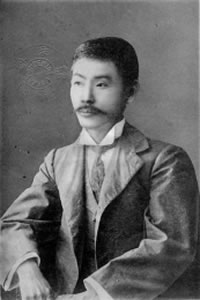De Nederlandse schrijver Frans Erens werd geboren op 23 juli 1857 in Schaesberg. Zie ook alle tags voor Frans Erens op dit blog.
Uit: De processie
„Zij waren gekomen van St. Jacob, zij kwamen van St. Folian. Uit alle parochies waren zij gekomen en zij trokken langzaam ëén voor éën achter elkander in twee rijen luid biddend, te samen biddend op den maatslag van den lang zamen stap door de straat, vrouwen en mannen, veel oude vrouwen en veel oude mannen en kinderen klein.
Zij trokken onder de breed-hangende vlaggen, die hingen uit de boven-ramen en daken der huizen. In de geopende ramen stonden de kaarsen met hun gele vlammetjes naast Christusbeelden en Mariabeelden; zij brandden tusschen bloemen, geen licht verspreidend in den hard-lichtenden dag, die geweldig licht-kaatste tegen de eene huizenrij met bibberende branding.
Zij waren gekomen van St. Petrus en van St. Michael en van St. Maria en van alle parochies en zij trokken door de zonnige straat.
De rozenkrans hangend in den hangenden arm, in den anderen hangend de hoed, gingen de voorbidders in het midden, met dirigeerenden stap in zwart-lange jas tusschen het volgende beenen-gestap. Hoog gingen ze met luid gebed, met kort afgebroken syllaben biddend, als commando’s boven de hoofden. De mannen baden de mannen vóór en de vrouwen de vrouwen.
De vrouwen sleepten luid het smeekend gebed. En met wijden cadans als een miserere zong het ‘wees ge gegroet Maria’ door de zonnige straat.
Zij waren gekomen van St. Paulus, van St. Laurentius en van alle parochies, zij baden en het zingend gebed steeg luidklagend op en weergalmde met golvend gedreun door de straat, waar alles in stilte en eerbied voorbij liet gaan de voortgaande menschenrijen.“

Frans Erens (23 juli 1857– 5 december 1936)
De Duitse schrijfster en televisiepresentatrice Thea Dorn (peudoniem van Christiane Scherer) werd geboren op 23 juli 1970 in Offenbach am Main. Zie ook alle tags voor Thea Dorn op dit blog.
Uit: Mädchenmörder
„Ich habe meiner Mutter verziehen, dass sie mir an jenem Abend das Auto nicht geben wollte. Es stimmt: Ich hatte meinen Führerschein erst seit einem halben Jahr. (Allerdings stimmt nicht, dass ich schon einmal betrunken nach Hause gefahren wäre. Ich trinke keinen Alkohol. Ganz einfach, weil mir Alkohol nicht schmeckt.)
Keiner kann sagen, ob ich nicht auch in die Hände jenes Menschen geraten wäre, wenn ich an diesem Abend das Auto gehabt hätte. Vielleicht hätte ich vor Carinas Wohnung keinen Parkplatz gefunden und wäre ihm auf dem Weg zum Auto begegnet. Oder ich hätte eine Panne gehabt, und ausgerechnet er wäre derjenige gewesen, der angehalten hätte, um mir zu »helfen«. Ich glaube, es war mein Schicksal, ihm an jenem Abend zu begegnen. Und sei nem Schicksal kann keiner aus dem Weg gehen. Deshalb habe ich aufgehört, mir diese Was-wäre-geschehenwenn- Fragen zu stellen.
Fest steht, dass ich meinem Entführer an der Haltestelle für den Nachtbus begegnet bin. Die Party bei Carina war langweilig gewesen, ursprünglich hatte ich gar nicht hingehen wollen. Kurz vor Mitternacht war Martin, Carinas älterer Bruder, gekommen, und er hatte mich überredet, noch ein bisschen zu bleiben. Später hatte er mir angeboten, mich nach Hause zu fahren.
Von heute aus betrachtet, ist es natürlich Hohn: Ich hatte es abgelehnt, mich von Martin nach Hause bringen zu lassen, weil ich das Gefühl hatte, er würde die Gelegenheit ausnützen, etwas von mir zu wollen. Nicht, dass mir Martin unsympathisch gewesen wäre. Aber ich hatte Angst vor einer Situation, in der er mich bedrängt. Um dieser Situation aus dem Weg zu gehen, rannte ich just jenem Mann in die Arme, der keinerlei Skrupel kannte, mit mir Dinge zu tun, die Carinas Bruder nicht einmal in seinen Alpträumen eingefallen wären.“

Thea Dorn (Offenbach am Main, 23 juli 1970)
De Amerikaanse schrijfster Lisa Alther werd geboren op 23 juli 1944 in Kingsport, Tennessee. Zie ook alle tags voor Lisa Alther op dit blog.
Uit: Kinfolks: Falling Off the Family Tree
„Her face freezes halfway between a smile and a frown as she tries to decide if this is a compliment. She was a model at the University of Rochester. In my favorite photo, she’s wearing a satin evening gown, standing inside a giant wine bottle, her black hair bobbed. But at home she resembles Harriet Nelson more than Loretta Young because she hates to buy clothes. My parents share a horror of spending money. Having grown up during the Great Depression and World War II, they say you never know when the next ax will fall.
Since my mother is from upstate New York, she doesn’t gush like normal mothers. She used to teach high school English, so she’s always coaching us to pronounce “cow” in one syllable. Our friends look at us as though we’re lunatics whenever we say “cow” as she recommends. But our cousins in New York still mock our southern accents when we visit them in the summer. They say southerners are stupid. Our Tennessee playmates say Yankees are rude. But I’ve met plenty of rude southerners and stupid Yankees.
My mother’s hobby is curling up in an armchair with the library books from which she’s always quoting. When she makes us take naps so she can read in peace, she announces, “I’ll but lie down and bleed awhile and then rise up to fight again.”
Once at supper, as she was carving a chicken, she looked up and said, “Children, always remember to stab low and pull up.”
“Why?” I asked.
“That way you sever the aorta.” She illustrated this in the air with her knife.“

Lisa Alther (Kingsport, 23 juli 1944)
De Duitse dichteres en schrijfster Irina Liebmann werd geboren op 23 juli 1943 in Moskou. Zie ook alle tags voor Irina Liebmann op dit blog.
Uit: Berliner Mietshaus
„Quergebäude, 2 Treppen rechts. Sibylle N.
Eine junge Frau mit wippenden, schwarzen Locken öffnet die Tür, zusammengerollt wie eine Raupe liegt ein winziger Säugling in ihrem Arm. Schwungvoll läuft die Mutter mir voran ins Wohnzimmer, straffer Pullover, enggeschnallter Gürtel, weiter Rock – Sibylle N. genießt ihr Babyjahr und freut sich über jeden Besuch.
Sofort erklärt sie mir die ganze Wohnungseinrichtung, die hellen Kindermöbel seien ihr Eigentum, die Küchenmöbel ebenfalls. Sie sage das nur der Ordnung halber, denn wer einmal etwas durchgemacht habe, der werde vorsichtig, und überhaupt: Ich halte mich hier nur auf. Ihre eigene Wohnung sei ein Zimmer in Pankow, die Wohnung hier allerdings benutze sie seit 1978, damals habe sie den Schlosser Bernd kennengelernt, dem seien die zwei Zimmer nach seiner Scheidung zugesprochen worden. Sibylle ist auch geschieden.“

Irina Liebmann (Moskou, 23 juli 1943)
De Duitse schrijver Kai Meyer werd geboren op 23 juli 1969 in Lübeck. Zie ook alle tags voor Kai Meyer op dit blog.
Uit: Die Wasserweber
„Am Morgen ihres letzten Tages in Aelenium besuchte Jolly den Hexhermetischen Holzwurm.
Sein Haus im Dichterviertel der Seesternstadt war schmal, gerade breit genug, um einer niedrigen Tür und einem Fenster nebeneinander Platz zu bieten. Wie überall in Aelenium gab es auch hier keine rechten Winkel und kaum eine gerade Wand. Die Gebäude der Stadt waren aus dem elfenbeinähnlichen Material der Koralle gearbeitet, manche auf natürliche Weise gewachsen, andere von Steinmetzen und Künstlern geschaffen.
„Ich bin’s“, rief sie, als sie an dem Wächter vorbeitrat und die Tür öffnete. „Jolly.“
Sie hatte nicht mit einer Antwort gerechnet und bekam keine. Sie wusste, wie es um den Wurm stand.
Hätte sich sein Zustand verändert, hätte man sie darüber in Kenntnis gesetzt.
Jolly schloss die Tür hinter sich. Das, was sie dem Hexhermetischen Holzwurm zu sagen hatte, ging den Posten nichts an. Zudem fürchtete sie, Munk könnte ihr gefolgt sein und sich unbemerkt hinter ihr ins Haus stehlen. Dass er ihr Gespräch mit dem Holzwurm mit anhörte, war das Letzte, was sie wollte.“

Kai Meyer (Lübeck, 23 juli 1969)
De Amerikaanse schrijver Hubert Selby jr. werd op 23 juli 1928 in Brooklyn, New York geboren. Zie ook alle tags voor Hubert Selby jr. op dit blog.
Uit: Compulsive writing
„My writing is inspired by just about everything, yet I am unaware of so much of the process. A particular incident may lead to just one line; for example, I remember a friend of mine telling a story about a guy who locked his mother in a closet and threatened to put a stake through her heart. This is a funny story in the telling and inspired the opening line of Requiem for a Dream: “Harry locked his mother in the closet” – but the book as a whole was not sparked by that anecdote.
Nor was the book inspired by heroin addiction, though it may seem to be. Certainly heroin can produce dreams, and all manner of illusions and delusions, but for me the book is about the great American dream, as promulgated by political/corporate America. We are taught in an infinite number of ways that the purpose of life is to get – and if you don’t get up early and start getting, someone will get your share. Yet it is not only the seeking of this dream that is deadly; its attainment is just as fatal.
So I guess it could be said that the inspiration for Requiem for a Dream is watching the American dream not only destroy so many lives in the US, but infect the rest of the world with its obsession with getting more, ignoring the deadly effect that has on the planet. The perfect example is how willingly the British government has endorsed the Bush obsession with oil, even though it may bring about a worldwide tragedy beyond imagination.“

Hubert Selby jr. (23 juli 1928 – 26 april 2004)
De Amerikaanse schrijver Raymond Thornton Chandler werd geboren in Chicago op 23 juli 1888. Zie ook alle tags voor Raymond Chandler op dit blog.
Uit: The Long Goodbye
„A low-swung foreign speedster with no top drifted into the parking lot and a man got out of it and used the dash lighter on a long cigarette. He was wearing a pullover check shirt, yellow slacks, and riding boots. He strolled off trailing clouds of incense, not even bothering to look towards the Rolls-Royce. He probably thought it was corny. At the foot of the steps up to the terrace he paused to stick a monocle in his eye.
The girl said with a nice burst of charm: “I have a wonderful idea, darling. Why don’t we just take a cab to your place and get your convertible out? It’s such a wonderful night for a run up the coast to Montecito. I know some people there who are throwing a dance around the pool.”
The white-haired lad said politely: “Awfully sorry, but I don’t have it any more. I was compelled to sell it.” From his voice and articulation you wouldn’t have known he had had anything stronger than orange juice to drink.
“Sold it, darling? How do you mean?” She slid away from him along the seat but her voice slid away a lot farther than that.
“I mean I had to,” he said. “For eating money.
“Oh, I see.” A slice of spumoni wouldn’t have melted on her now.
The attendant had the white-haired boy right where he could reach him–in a low-income bracket. “Look, buster,” he said, “I’ve got to put a car away. See you some more some other time–maybe.”
He let the door swing open. The drunk promptly slid off the seat and landed on the blacktop on the seat of his pants. So I went over and dropped my nickel. I guess it’s always a mistake to interfere with a drunk. Even if he knows and likes you he is always liable to haul off and poke you in the teeth. I got him under the arms and got him up on his feet.
‘Thank you so very much,” he said politely“.

Raymond Chandler (23 juli 1888 – 26 maart 1959)
Onafhankelijk van geboortedata:
De Duitse dichter en schrijver Sascha Kokot werd geboren in Osterburg in 1982. Zie ook mijn blog van 23 juli 2009.
Nach dem dritten Tag Regen
Nach dem dritten Tag Regen
versank der Vater mit dem Nachbarn
in dem am Morgen frisch bestellten Feld
half auch Bier und Schnaps nicht fort
kam am Abend fröhlich fluchend
jemand aus dem Dorf herüber
zog Belarus, Dichter und Saboteur
aus dem Kartoffelacker
schenkte dem glotzenden Kind
Weidenholz für einen Triller.

Sascha Kokot (Osterburg, 1982)






